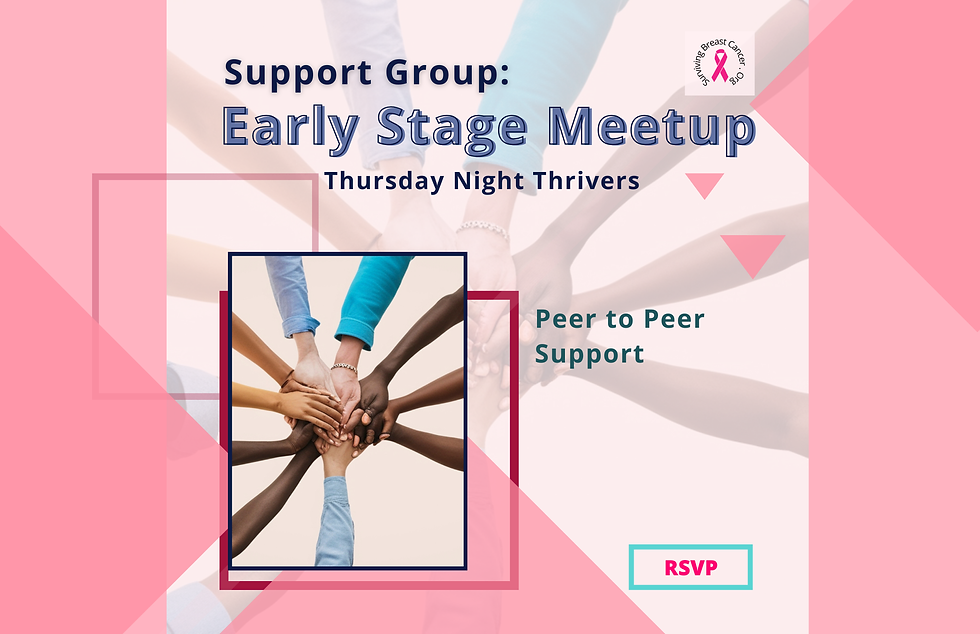New Options for Advanced Cancer Patients
- Surviving Breast Cancer

- Aug 7, 2022
- 4 min read
Updated: Sep 15, 2025
Personalized Cancer Treatment Strategies 101
We all know that the standard of care is simply not enough and if the cancer is not contained early on and actively managed, then it will most likely recur and progress.

Below are a few examples of personalized options that often lead to better treatment results and longer time in remission:
Newly Diagnosed Patients
Chemo Sensitivity Testing
Oncologists typically have to choose between a handful of standard chemotherapeutic agents to start from. This decision is often based on little knowledge about the tumor. BUT chemotherapy has toxic side effects, which weaken the body and decrease its ability to fight cancer. If the right chemo isn't chosen (which is often the case), the patient experiences toxicity with no benefit.
Chemo-sensitivity testing tests and determines the most effective drug or combination for the patient. It is not routinely done because it requires viable tumor tissue and because it is an out-of-pocket expense. Pursuing this test upfront will set the patient up on the right treatment course from day one.
Personalized Cancer Vaccine
Surgery is followed by chemo, and chemo is followed by a passive monitoring period (scans, MRI, etc). This period is referred to as a “wait-and-see”, and reactions are only made when the problem recurs. BUT there are experimental tools to activate the immune system to fight cancer proactively. A personalized cancer vaccine is a type of immunotherapy that directs the patient's own immune system to recognize unique markers on the tumor and then awaken it to actively fight cancer cells, helping to reduce the chances of recurrence.
In a perfect world, every patient should get vaccinated, but we are not there yet. This treatment is not routinely done because it requires viable tumor tissue and because it requires a complex infrastructure to prepare and administer. It is also experimental (but tested at various academic institutions), and has little or no side effects (good quality of life). Pursuing a personalized vaccine is a proactive way of fighting cancer, can extend time in remission, and reduce the chances of recurrence.
Recurrence or Advanced Patients
Genetic Sequencing
Targeted drugs are different from chemotherapeutic agents. Chemo kills good and bad cells, while targeted drugs are designed to kill the bad cells. A genetic sequencing test (also referred to as a molecular profiling test) identifies unique markers on your tumor, and matches those to drugs designed to target mutations expressed on the tumor.
While this often reveals treatment options beyond the current standard of care (because some of the drugs are experimental), this diagnostic does not test whether the drug actually works on that tumor or not. It narrows down a list of about 100+ targeted drugs to about 10, thus giving the oncologist direction. This test is almost routinely ordered in the USA, sometimes covered by insurance, and requires paraffin (dead) tumor tissue. Pursuing this test upfront will identify targeted drugs your oncologist can use to treat your cancer.
Drug Screening Test
This test screens for the widest range of chemotherapeutic agents, targeted drugs, and experimental drugs (not designed to target a specific mutation). It tests the various options and combinations on the tumor itself and prioritizes the best one that works (so it is not theoretical). This test is not routinely done because it requires viable tumor tissue and because it is an out-of-pocket expense. Pursuing this test upfront will help you identify a chemo, a targeted drug, or an experimental drug from a wider range of options, and confirm that the drug works before wasting a lot of time and effort pursuing a treatment that does not work.
Mouse Xenograft Models
This is a deeper version of the drug screening test. The idea is to grow the patient’s tumor in mice so when screening drugs, one does not only have the cancer cells, but the entire tumor environment to test on. This helps explore advanced, experimental, and combinational drugs that might work (or drugs that have previously worked on other indications) rather than experimenting on the patient’s body. This is helpful when you have a rare disease or very limited treatment options left.
This test is not routinely done because it requires viable tumor tissue and because it is an out-of-pocket expense. Pursuing this test upfront will help you identify a chemo, a targeted drug, an experimental drug, or a combination of them, and also confirm that the drug works before wasting a lot of time and effort pursuing a treatment that does not work.
Personalized T-Cell Therapy
Also referred to as TILs (Tumor Infiltrating Lymphocytes) is a form of Immunotherapy, and often complements vaccines. Vaccines recruit more soldiers to the battle by educating the part of the immune system that does not recognize the cancer. T-cell therapy also recruits more soldiers to the battle, but by cloning and multiplying the part of the immune system that recognizes the cancer, thus giving your own immune system a better chance to fight the cancer cells with little or no side effects.
Ideally, every patient should get T-cell therapy, but this is not yet feasible. T-cell therapy is not routinely performed because it requires viable tumor tissue, is experimental, and requires a complex infrastructure to prepare and administer. Pursuing T-cell therapy boosts the immune system to fight cancer in parallel to other treatments you are on, can extend time in remission, and reduce the chances of recurrence.
Bottom Line
No two tumors are alike, and each contains important information critical to the treatment, BUT tumors are NOT preserved alive by the hospitals and are routinely discarded. Personalized treatments start with having access to the viable tumor, Store My Tumor. For more information: www.storemytumor.com
Team StoreMyTumor
+1.267.702.5501










